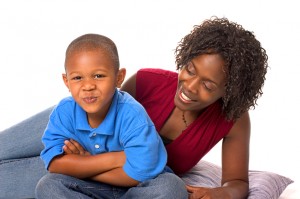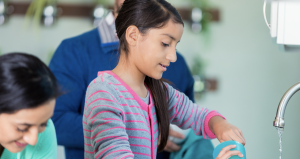Should our goal for our kids be for them to be happy?

Many times in my office parents say their goal is for their child to be happy. As a therapist, I have to wonder if being happy is really what we want? When are our children happy? When they get a birthday present; get a cookie they wanted; win at a game. If life consisted of pleasant surprises and getting what we want, than it would be easy to be happy and stay happy. However, the truth about life is that when the umbilical cord is cut, life does not always deliver pleasant surprises and isn’t always easy.
Instead of happiness being the goal for our children, we should consider the goal to be resilience. I think of it like endurance. To run the marathon or lift weights, one needs to practice. Little by little, capacity is expanded, so the goal is reached. Along the way, measurable progress and encouragement keep us on track. Similarly, the emotional growth that builds resilience must be incrementally acquired. Little by little, challenges are faced – the disappointment that your ice cream fell off the cone, losing at Candyland, or not getting invited to someone’s birthday party. Each of these experiences is painful, yet each of these upsets can be a stepping-stone to building resilience. Lessons that get learned in each of these childhood experiences become foundational to our capacity to handle the bigger challenges life will present. How do I calm down when I’m upset? Who is around to help me with my feelings? How do I learn to get along with others?
Embedded in each childhood upset is an important pothole on the road of life. To master challenges while our children are growing their resilience, like the athlete struggling to gain endurance, our children need us to be good trainers, coaches, and cheerleaders. Challenges too great will foreseeably lead to failure or discouragement. Consequently, we want to expose our children to those just a bit beyond their comfort zone. When they achieve, our presence to celebrate encourages our children to pursue their next aspiration.
Often we fear the distress, despair or tantrums that our children express and we must endure when they are unhappy. Challenges avoided or never faced put the child at risk for being vulnerable, insecure, defensive, fearful, or confused. Mindful parenting that considers the growing edge of our child’s development, like a good coach does when training an athlete, facilitates resilience by presenting incremental challenges. When failure or disappointment occur, being present to help our children with their feelings teaches them they are not alone and to try again. Ultimately, this resilience will provide the foundation for our children to reach his/her potential for achievement and true happiness.
Tags: communication with children, good parenting, parent child communication, parenting, parenting advice, parenting skills, psychological advice, teenage depression2 Comments
Leave a Reply
You must be logged in to post a comment.










Not the longest post, but then again myNJ Party Guide site hasn’t many posts either, and a rubbish design – Great post all around, added your XML feed! Cheers
This is kind of ridiculous. One paragraph in and I almost stopped reading when I realized you believe children are only happy when they get stuff. This is ABSOLUTELY not true. Yes those things bring brief happiness but that is NOT what happiness is or what it should be measured by. Happiness is a GREAT goal to aim for. I will never stop wanting happiness for my child. Resilience is not and never will be a replacement for happiness, and wanting happiness for our children should not be looked down upon as if we should be aiming for something else. Children are not as shallow as you seem to believe. They are able to achieve actual happiness that has nothing to do with getting a new toy. LOVE brings happiness. Kindness. Health. Hope. Resilience is not a replacement for happy. Im kind of baffled a therapist would suggest for someone to teach their children resilience INSTEAD of happiness when in fact they should go hand in hand.